Operating Principles for the Ministry of Catholic Health Sponsor Expectations

Mission: Why we exist
We are called to reveal the healing love of Jesus to all.
Vision: What we are trying to do
As your trusted partner, inspired by faith and committed to excellence, we lead the transformation of healthcare and create healthier communities.
Values: What guides our behavior
Reverence Compassion Integrity Innovation Community Excellence
We honor the inherent dignity and uniqueness of each person.
We unconditionally demonstrate empathy, kindness, and acceptance.
We are honest, transparent, and accountable. We continually learn, find creative solutions, and embrace change.
We work together to build community and promote social justice in our organization and in society. We commit to achieve the highest standards of quality, safety, and service.
2
Standards of Behavior
Reverence
We honor the inherent dignity and uniqueness of each person.
• I am a caregiver who extends a welcoming hand to all, and I nurture a healthy work environment.
• I respect individual differences and foster a culture of inclusion and civility by seeking to understand and accept diverse perspectives, ideas, and backgrounds.
• I allow everyone to have a voice, and I involve patients, families, and staff in decisions that affect them.
• I treat all persons with whom I serve and work with respect, recognizing their uniqueness, dignity, and giftedness.
Compassion
We unconditionally demonstrate empathy, kindness, and acceptance.
Integrity
We are honest, transparent, and accountable.
• I am authentic and truthful.
• I model consistency between my words and my actions.
• I do the right thing, even when no one is looking.
•
I am an equal participant — as accountable as any other caregiver — and I address concerns in an appropriate and respectful manner.
Community
We work together to build community and promote social justice in our organization and in society.
• I uphold a culture of belonging and inclusiveness.
• I foster collaboration and teamwork, respectfully engaging with both Catholic Health and our community.
• I advocate for and stand with those who are poor and vulnerable to remove the causes of oppression and promote social justice for all.
• I am a good steward of our resources and our environment.
• I am purposefully engaged with others, offering warmth and respect in both joy and suffering.
• I take the time to understand and care for others in an open-minded, nonjudgmental way.
• I reveal God’s healing presence to all.
• I advocate for voiceless and disadvantaged persons, and help them advocate for themselves.
Innovation
We continually learn, find creative solutions, and embrace change.
• I value and offer new ideas.
• I take initiative and measured risks, question the status quo, and challenge everyone to think courageously.
• I take a proactive approach to problem-solving.
• I am supportive and flexible when change occurs.
Excellence
We commit to achieve the highest standards of quality, safety, and service.
• I continually seek best practice and strive to exceed expectations, putting the patient at the center of everything I do.
• I embrace opportunities for personal and professional growth.
• I recognize team members by celebrating and addressing performance in a timely, constructive manner.
• I am determined to put the needs of the greater good above my own.
2
A Leader’s Prayer
God our Father, make us an instrument of service. In speech, give us a well-trained tongue. In decisions, give us wisdom and knowledge. In trials, give us hope, joy and peace. And in all things, give us gentleness and mercy.

May we always witness to the truths that the work we do is ministry in your Name, the life we proclaim and protect is eternal, all we serve are created by you.
Help us always to remember that the love and healing presence of Jesus is present each moment of our service.
Continue your work in us, Holy Spirit, that our service always reflects your goodness. We ask all this in the name of Jesus, the foundation and future of our ministry.
Amen.
A Leader’s Prayer adapted from CHA’s Prayer for a Mission Leader https://www.chausa.org/prayers/cha-prayer-library/prayer/prayer-for-a-mission-leader.
5
Introduction
Peace and all good things! Welcome to our Catholic Health family! Thank you for saying yes to God’s invitation to use your unique gifts and talents to reveal the healing love of Jesus to all. Yours is more than a job or a service. Yours is a vocation and each of you play an essential role in our Catholic Health ministry, Whether you are a board member, CEO, VP, doctor, nurse, secretary, environmental engineer, chef, chaplain, maintenance worker, volunteer, or any other associate; each of you is ESSENTIAL to our ministry and we are blest to have you.
“It’s in your hands.” With these words, more and more religious congregations are handing over their ministries or responsibility for their ministries to lay leaders and to those working within those ministries.

But what is it that’s in our hands? It’s much more than health care facilities or a health system. It is a ministry—a ministry of healing and of service. It is the sacred transcendent purpose entrusted to us. Health care facilities and health systems are vehicles for that ministry.

Catholic Health’s mission statement
captures this well: “We are called to reveal the healing love of Jesus to all.” We are all called to carry on the healing mission of Jesus and the ministry of the sisters and clergy in whose footsteps we walk. We are also called to carry on a ministry of the Catholic Church and, as such, to ensure the Catholic identity of Catholic Health and to do so in a manner that is truly “catholic,” that is, universal, all-embracing, welcoming, and respectful of all. This is why Catholic Health exists. This is what is in our hands.
This document, “Operating Principles for the Ministry of Catholic Health: Sponsor Expectations,” is something of a roadmap for ensuring that what is in our hands thrives and flourishes—that the ministry that is Catholic Health and its mission and Catholic identity are supported, deepened, advanced, and strengthened well into the future. The ten principles and their applications focus on attitudes, behaviors and initiatives that are critical, even foundational, to living out and being true to the mission. And while each and every member of Catholic Health has a role to play in and a responsibility for living out the mission, these operating
principles seek to identify and highlight the particular responsibilities of the sponsors, of governance, and of leadership.
In particular, it is the sponsors in whose hands the ministry of Catholic Health has been entrusted and who are charged or better, gifted, with the sacred responsibility for ensuring that the mission and Catholic identity of Catholic Health serve not only as the foundation, the inspiration, and the benchmark for all that Catholic Health is and does, but as a cornerstone and a priority throughout the organization.
The sponsors ensure that mission drives the organization and that carrying out the mission is why Catholic Health exists.
Their primary role, in the words of the Catholic Health Association, “is to ensure that the mission of Catholic health is carried out, now and in the foreseeable future.
A sponsor is a steward, accountable to the Church for the organization’s Catholic identity and ministry, as well as its financial health and property ownership.”1 The sponsors share this responsibility with governance and leadership, each having their respective roles as outlined in the implications and applications of each principle.
The sponsors are committed to working with board members, senior management, associates, physicians, and others in providing leadership and in promoting shared responsibility for the continued viability of this health care ministry.
“Operating Principles for the Ministry of Catholic Health” serves several purposes. First and foremost, it lays out critical elements for ensuring the successful living out of Catholic Health’s mission, heritage, and Catholic identity. In doing so, it functions as both a reminder of what needs to be done and a call to action on the part of sponsors, governance, and leadership. Second, it serves as a foundation and catalyst for planning initiatives and programs that advance and strengthen the mission, and as a guide and influence for shaping policies and practices, all of which contribute greatly to forming the organization’s culture and identity. And, third, this resource can serve as a benchmark for evaluating how Catholic Health is living out its mission by helping to identify areas of strength and opportunities for improvement that in turn lead to the development of action plans.
7
These ten ministry operating principles present a challenge that, when embraced, will transform both minister and ministry, deepening their response to the call to live the mission thereby strengthening their identity. While their responsibilities differ from principle to principle, the goal for sponsors, governance and leadership is clear: to integrate and live the mission of Catholic Health at every level and in every ministry setting. Fidelity to the values, attitudes, behaviors, practices and strategic choices through values-based decisionmaking and discernment these principles outline will ultimately demonstrate the successful integration of the mission throughout the system. It will also ensure that the ministry which has been placed in the hands of Catholic Health, will flourish.
We stand on the shoulders of all who have
been a part of Catholic Health and we join you in continuing to build upon the rich legacy that is entrusted to all of us. May each of us be blest to find in one another and in each person we serve, the face of God. Be assured of our continued prayerful support and that of the Diocese of Buffalo, and the Franciscan Sisters of St. Joseph. Blessings.

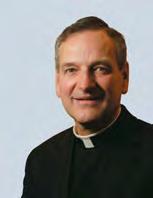
At a Glance: The Ten Operating Principles
Principle 1: We embrace the mission of Catholic Health, to reveal the healing love of Jesus to all, and its integration as a priority throughout the organization.
Principle 2: We are guided by the theological and ethical teaching of the Catholic Church in all that we do, including decision-making, planning, and programming.
Principle 3: We commit to the development and ongoing implementation of a program of formation for all who serve in this ministry, especially those in leadership.
Principle 4: We commit to ongoing initiatives to sustain and deepen a culture of spirituality and to meet the spiritual needs of all who serve in or are served by our ministry, regardless of faith tradition.
Principle 5: We commit to a servant leadership style that models participation, collaboration, and a commitment to our ministry.
Principle 6: We foster a culture of inclusion and community marked by hope, mutual respect, fairness, and an embracing of individual differences.
Principle 7: We collaborate with local partners to address our communities’ health needs and social determinants of health, with special attention to those who are poor and vulnerable.
Principle 8: We work to address social ills and injustices at the local and national levels, and collaborate with others as appropriate in these advocacy endeavors.
Principle 9: We commit to prudently steward all of our resources to allow us to continue our mission of delivering quality care and promoting health and wellness in an environmentally responsible manner.
Principle 10: We conduct a review of these principles at least every five years and regularly assess their implementation.
1 Karen Sue Smith, “Overview of Sponsorship: A Supplement to CHA’s Sponsorship Video, ‘Go and Do Likewise. Sponsorship of the Catholic Health Ministry’.” www.chausa.org/docs/default-source/sponsorship/overviewofsponsorship-karensuesmith.pdf?sfvrsn=0.
Rev. Msgr. Robert E. Zapfel, STD, MBA Diocese of Buffalo
Sr. Marcia Ann Fiutko, FSSJ
Franciscan Sisters of St. Joseph
98
Principle One
GOVERNANCE LEADERSHIP
a. Formulates the mission statement, values, and vision of Catholic Health to provide a basis for its culture and a direction for its decisions and activities in order to ensure the continuation of the healing ministry of Jesus.
b. Approves the strategic plan and strategic directions, ensuring that they reflect and advance Catholic Health’s mission, values, and vision.
c. Ensures that the yearly budget is influenced by and advances the organization’s mission and values.
d. Participates in Formation activities and ensures the existence and implementation of a robust formation plan for the entire organization.
e. Sets policies and make decisions that advance and strengthen the mission of Catholic Health, employing the Catholic Health Dialogue/Decision-Making Process when appropriate.
a. Incorporate Catholic Health’s mission and values into operations, planning, and decision-making, ensuring that our mission is always a strategic priority
b. Ensure that the mission leaders are part of senior leadership, are structurally and fully integrated into decision-making and operations, and have adequate personnel and financial resources for mission-related programming and activities.
c. Foster mission awareness and Catholic identity throughout the organization through various means (e.g., communications, activities, artwork, educational programs, orientation, making visible Catholic Health’s mission and values).
d. Work to preserve and make known the heritage of founding religious congregations (e.g., through heritage walls, artifact displays, heritage days).
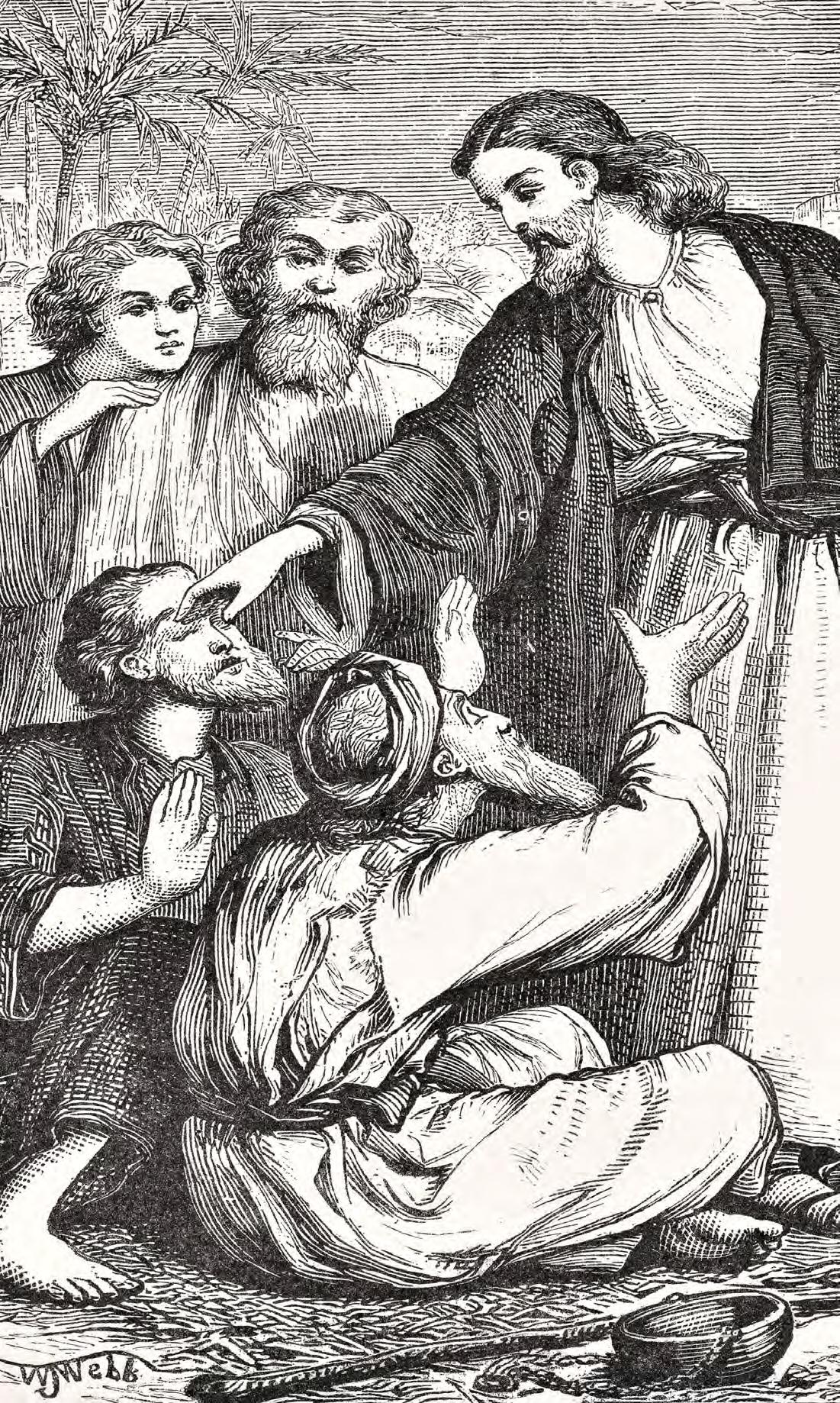
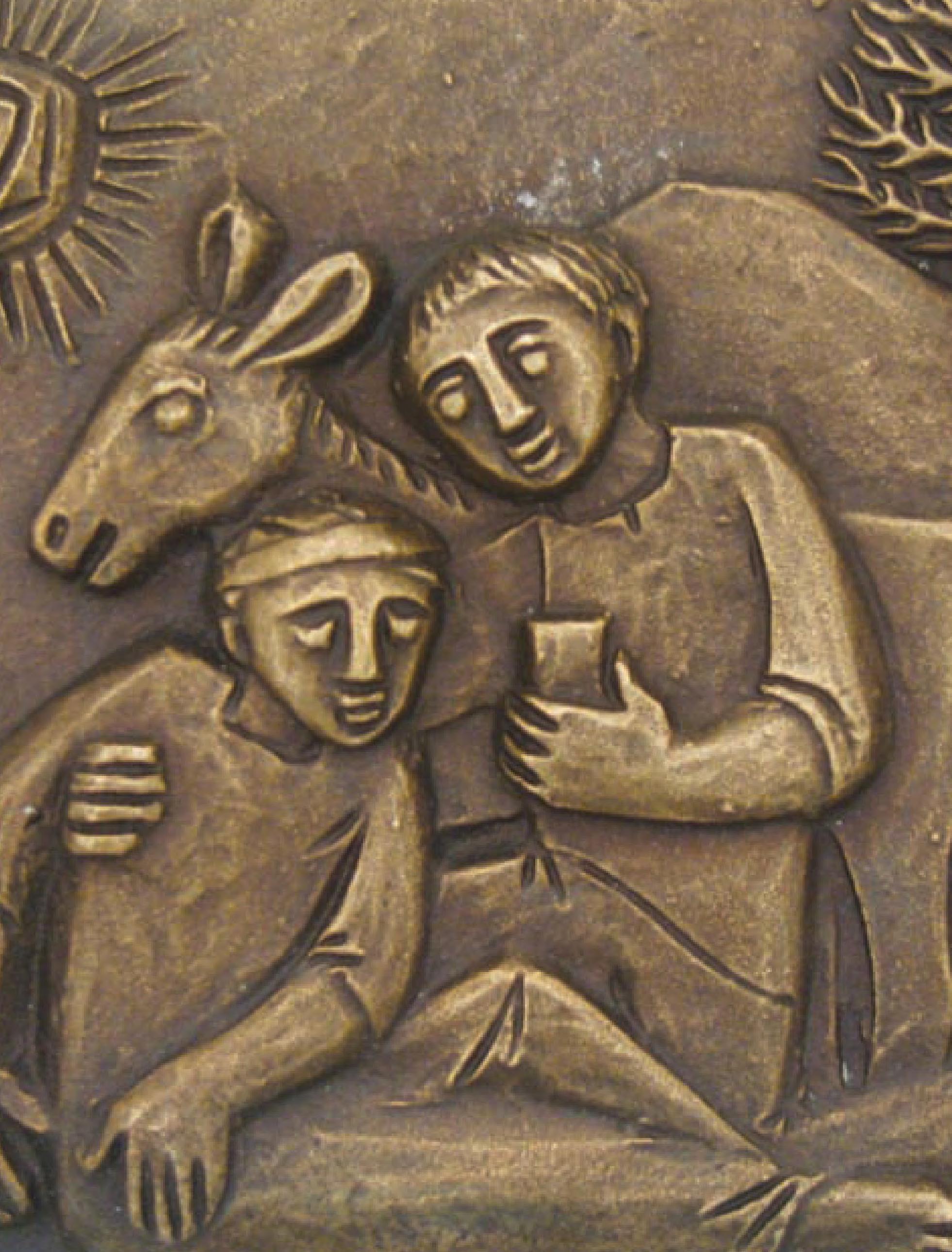
e. Ensure that all marketing and hiring is mission-focused.
f. Ensure that annual performance evaluations for Catholic Health associates include accountability for living out the organization’s mission and values.
We embrace the mission of Catholic Health, to reveal the healing love of Jesus to all, and its integration as a priority throughout the organization.
11
MEMBERS & SPONSORS GOVERNANCE
a. Ensure that organizational policies and practices adhere to Catholic teaching in all respects, including Catholic social teaching.
b. Show preference for Catholic collaborations and partnerships when possible.


c. Ensure that partnerships with other-than-Catholic organizations are guided by Part Six of the Ethical and Religious Directives and are generally limited to those entities aligned with our mission and values.
d. Ensure that ministry-related education occurs on a regular basis, particularly for board members and leadership. This should include but is not limited to the Ethical and Religious Directives, elements of Catholic social teaching, foundational theological concepts of Catholic health care (e.g., Jesus’ healing ministry, Catholic health care as a ministry of the church), and the heritage of Catholic Health’s founding religious congregations.
e. Require regular opportunities for education for the board on ethical issues facing Catholic health care.
f. Participate in continuing education for the board and church leaders on ethical issues in Catholic health care and require that management keep church leaders apprised of emerging issues.
g. Communicate regularly with the bishop and Church leaders in order to preserve and promote the understanding of issues facing Catholic Health.
a. Sets policies and makes decisions that are in accord with Catholic teaching and ensure that management is accountable for adherence to these standards.
b. Shows preference for Catholic collaborations and partnerships when possible.
c. Ensures that partnerships with other-thanCatholic organizations are guided by Part Six of the Ethical and Religious Directives and are generally limited to those entities aligned with our mission and values.
d. Participates in regular board education/ formation on the theological and ethical foundations of Catholic health care.
e. Stays apprised of emerging and ongoing ethical issues in Catholic health care.
f. Reviews reports on activities and programs that exemplify a commitment to Catholic social teaching (e.g., community benefit) and to various aspects of the Ethical and Religious Directives on a regular basis.
g. Ensures a positive relationship with the local ordinary through on-going communication, periodic visits and invitations to special events.
Principle Two
LEADERSHIP
a. Ensure that operations and planning are carried out in a manner consistent with the theological and ethical teaching of the Church, especially as articulated in the Ethical and Religious Directives and Catholic social teaching.
b. Ensure that partnerships with other-than-Catholic organizations are guided by Part Six of the Ethical and Religious Directives and are generally limited to those entities aligned with our mission and values.
c. Employ the available Mission Screens when evaluating partnerships and other business ventures/initiatives.
d. Ensure there is ongoing, varied education (e.g., orientations, in-services, and intranet) on these foundational concepts, principles, and directives for all board members, associates, and physicians that is appropriate to their role in the organization. This includes providing them with a copy of the Ethical and Religious Directives.
e. Ensure that Catholic Health has ethics resources available and a system ethics committee to deal with organizational and clinical ethical issues that are best addressed at the system level.
f. Require each ministry to have an ethics committee that is equipped to offer case consultation, ongoing self-and-associate education, and policy development, and establishes and tracks key performance indicators.
g. Promote the Ethical and Religious Directives and Catholic social teaching as sources of guidance for planning, policies, programs, activities, practices, and care delivery.
h. Urge use of the “Dialogue/Decision-Making Process.”
i. Maintain regular dialogue with the local bishop, sponsors, and community church leaders in order to support and strengthen Catholic Health as a ministry of the Catholic Church and of the sponsors.
We are guided by the theological and ethical teaching of the Catholic Church in all that we do, including decision-making, planning, and programming.
12
MEMBERS & SPONSORS
Principle Three
a. Encourage the development and implementation of an annual formation plan for all levels of the organization, including board members and leadership.

b. Participate in ongoing formation, particularly in regards to the nature of sponsorship, the responsibilities of sponsors, the nature of Catholic health care, the Ethical and Religious Directives, and Catholic social teaching.
GOVERNANCE LEADERSHIP
a. Participates in continuing education programs such as those offered by the Catholic Health Association and other organizations that are relevant to sponsors to advance the mission and ministry of the Catholic Church.
b. Participates in on,going formation, particularly about the nature of Catholic health care, health care as a ministry of the Church, Catholic social teaching and the Ethical and Religious Directives.
c. Participates in continuing education programs such as those offered by the Catholic Health Association and other organizations that are relevant to board members, such as the annual CHA Assembly, Governance workshops, and the CHA Foundations of Catholic Health Care course.
a. Ensure the creation and implementation of an annual formation plan for leaders and managers across the organization.
b. Engage in ongoing formation related to the ministry of Catholic health care.
c. Ensure that participation in at least one formation activity is incorporated into annual performance evaluations.
d. Provide resources to support formation programs and activities.
e. Identify and recommend resources available within the community.
We commit to the development and on going implementation of a program of formation for all who serve in this ministry, especially those in leadership.
15
MEMBERS & SPONSORS GOVERNANCE
a. Require the existence of a well-prepared, effective, and numerically adequate mission and spiritual care staff to address the spiritual concerns and needs of patients, residents, clients, families, associates, physicians, and volunteers of various faith traditions.
b. Encourage communications, activities, and programs that draw upon the charisms of the founding religious congregations to help shape the culture of the organization.
c. Require that each ministry actively promote a culture of spirituality.

d. Encourage the development and implementation of a program of spirituality in the workplace that accounts for a variety of faith traditions.
e. Meet periodically with the mission and spiritual care leaders to learn of their initiatives in these areas, as well as their
a. Ensures that mission and spiritual care are priorities across the organization.
b. Assures adequate mission and spiritual care resources across the ministry.
c. Requires that mechanisms be in place to ensure that holistic care is provided to those who seek the services of Catholic Health.
d. Requires concrete measures that foster a culture of spirituality throughout the organization and reviews such measures at least every year.
e. Adopts concrete steps to foster spirituality.
f. Requires that appropriate and effective structures are in place to ensure that potential associates of Catholic Health are spiritually grounded and professionally qualified to provide services to patients, clients, residents, families/caregivers in keeping with our mission and values.
Principle Four
LEADERSHIP
a. Ensure that each ministry has a chapel or sacred space that is readily accessible for reflection, prayer, and worship and is open to persons of all faith traditions. Eucharist is celebrated regularly in our hospitals and long-term care facilities, and sacramental needs are met.
b. Ensure there are a variety of opportunities for daily prayer/reflection (e.g., at the beginning of meetings, over PA systems, on the intranet).
c. Assure that each ministry creates a comprehensive healing environment and one reflective of God’s healing presence.

d. Assure that each ministry marks religious occasions and heritage days with prayer and rituals that affirm the Catholic, spiritual nature of the organization.
e. Promote educational sessions for associates, volunteers, physicians, and directors that explore ways, drawing from various faith traditions, to integrate spirituality into the workplace and their personal lives.
f. Promote the use of various means of communication (e.g., intranet, newsletters, signage) to further support and enhance a culture of spirituality.
g. Provide appropriate and adequate support and resources to ensure that spiritual care professionals/chaplains are an integral part of health care services in all entities.
h. Ensure that spiritual care staff includes persons of diverse faith traditions and cultural
We commit to ongoing initiatives to sustain and deepen a culture of spirituality and to meet the spiritual needs of all who serve in or are served by our ministry, regardless of faith tradition.
16
GOVERNANCE LEADERSHIP
Encourage and support servant leadership across the ministry of Catholic Health as the and employ the principles and practices of servant leadership (e.g., listening, empathy,
Employ a style of servant leadership in their relationships with the board of directors and in the exercise of their respective Reserved
a. Learns about the principles of servant leadership.
b. Employs the principles of servant leadership in fulfilling its roles and responsibilities (e.g., listening, empathy, persuasion, building community).
c. Holds leadership accountable to a servant leadership style of management.
a. Develop a culture that fosters and supports servant leadership, employing its principles and practices (e.g., listening, empathy, persuasion, building community).

b. Practice participation, collaboration, and subsidiarity in discussions and decision-making as appropriate to foster a culture of transparency, trust, and belonging.
c. Employ existing mechanisms and tools (e.g., forums, town halls, leadership rounding, department meetings, newsletters) that foster participation, collaboration, and subsidiarity.
We commit to a servant leadership style that models participation and collaboration and a commitment to ministry Principle Five
19
MEMBERS & SPONSORS GOVERNANCE
a. Require that (policies, practices, procedures and work environments) at Catholic Health are shaped by the tenets of Catholic social teaching and adhere to the Ethical and Religious Directives.
b. Encourage Catholic Health to reflect the diversity of the community and demonstrates the utmost respect for individual differences in its policies, practices, and procedures.
c. Urge the provision of culturally appropriate programs and services within the organization, and the communities served.
d. Urge the recommendation and appoint of Catholic Health board members who represent the cultural and gender diversity within the communities served.
a. Holds leadership accountable for ensuring that all aspects of the workplace (e.g., policies, practices, procedures, and environments) in each ministry are shaped by the tenets of Catholic social teaching and adhere to the Ethical and Religious Directives.
b. Holds leadership accountable for ensuring that Catholic Health reflects the diversity of the community and demonstrates the utmost respect for individual differences in its policies, practices, and procedures.
c. Approves policies, practices, and initiatives that demonstrate a culture of hope, dignity, and respect for all associates, patients, residents, and physicians.

d. Holds management accountable for the development and provision of culturally appropriate programs and services within the organization and the communities served.
e. Seeks the appointment of Catholic Health board members who represent the cultural and gender diversity within the communities served.
f. Sets expectations for the selection of local board members and the hiring of associates to reflect the diversity of the communities served.
Principle Six
LEADERSHIP
a. Ensure that policies, procedures, and practices regarding employment, salary and benefits are equitable and reflect Catholic social teaching, and Catholic Health’s mission and values.
b. Ensure that wages, salaries, and benefits are regularly reviewed and tested for equity and justice.
c. Assure that a mechanism is in place for associate participation in decision-making.
d. Assure the establishment of mechanisms and practices which regularly demonstrate an appreciation of the work being done and the care being provided, and recognizes excellent service, years of service, and special events in the life of the system, for each ministry, and for every individual.
e. Foster a culture in which associates are encouraged in on-going learning and skill development, motivated to reach their potential, empowered to respond to service needs, and recognized for their achievements.

f. Demonstrate an understanding of Catholic ethical and social teachings and their implications for the workplace
g. Assure the implementation of various mechanisms to foster and support a culture of diversity and inclusion, one that shows respect for differences in race, color, creed, religion, gender orientation, disability, age, and national origin.
h. Require that policies and practices ensure equity and appreciation of cultural differences and learning opportunities to develop cultural competency internally and in the care of patients and their families.
We foster a culture of inclusion and community marked by hope, mutual respect, fairness, and an embracing of individual differences.
20
MEMBERS & SPONSORS
Principle Seven
GOVERNANCE LEADERSHIP
a. Receive annual reports on strategies, outcomes, and effectiveness of initiatives to address community health needs and social determinants of health.
b. Approve the annual budget for initiatives to meet community health needs.
c. Ensure that community health needs assessments are deployed to identify the most pressing community health needs, especially among those who are poor and vulnerable.
d. Promote collaboration with community partners in addressing community health needs.
e. Require that care for the poor and vulnerable is integrated into all planning and that Catholic Health actively addresses their needs in whatever way and to the extent possible.
a. Guides the development and approval of plans to address community health needs.
b. Regularly receives and assesses reports that detail the initiatives, outcomes, and effectiveness of community health initiatives.
c. Ensures that in addressing community health needs, preference is given to initiatives focused on the needs of the poor and vulnerable.
d. Ensures that there are adequate resources, based on 1 percent of total Catholic Health income (or at least $100,000), to address designated community health needs.
e. Promotes collaboration with community partners and representatives in addressing community health needs.
a. Ensure that Catholic Health ministries promote quality services and ensure access to a continuum of care aimed at improving the health status of individuals and communities.
b. Assure that Catholic Health ministries address the social, physical, psychological, spiritual, and environmental needs of those they serve.
c. Assure that Catholic Health ministries conduct and utilize a community needs assessment to address the current and future health needs and social determinants of health in the communities they serve.

d. Allocate the necessary resources to address the social determinants of health in the communities we serve.
e. Strive continuously to better understand those we serve and welcome their perspectives.
f. Ensure that caring for those who are poor and vulnerable is a priority in strategic and budget planning across the system.
g. Promote the creation of a variety of opportunities for all members of Catholic Health to volunteer time, talents, and resources to those who are poor and vulnerable in our communities.
h. Require that community benefit investments follow Catholic Health Association guidelines and appropriate state and federal regulations.
We collaborate with local partners to address our communities’ health needs and social determinants of health, with special attention to those who are poor and vulnerable.
23
MEMBERS & SPONSORS
Principle Eight
GOVERNANCE LEADERSHIP
Challenge the organization to be a prophetic voice on behalf of the common good and actively promote systemic social justice through the lens of health equity on the federal, state, and local levels, with special attention to those who are most vulnerable. Encourage the provision of the necessary financial and human resources to support a strong advocacy program, particularly on behalf of persons who are poor and
Encourage the ministry to partner with other organizations at the federal, state, and local levels, particularly those whose values are most consistent with our own, to address social ills and injusticese.
a. Requires initiatives that promote social justice within Catholic Health, in the communities we serve, and at the state and federal levels.
b. Promotes and supports efforts to advance accessible, affordable, quality and just health care for all.
c. Regularly review reportss that describe advocacy initiatives, outcomes, and impact, and guides ongoing efforts.
a. Promote advocacy initiatives to address social ills and injustices at the local, state and federal levels, particularly those affecting underserved and vulnerable populations, and establish accountability mechanisms for the successful implementation and effectiveness of these initiatives.
b. Promote collaboration with community, state, and federal partners in advocacy efforts.
c. Provide the human and financial resources necessary for a strong advocacy program.

d. Encourage all associates and community leaders to become active advocates as part of their commitment to Catholic Health.
e. Ensure that mission leadership influences the development of public policy and advocacy initiatives.
We work to address social ills and injustices at the local and national levels and collaborate with others as appropriate in these advocacy endeavors.
25
Principle Nine
MEMBERS & SPONSORS GOVERNANCE
LEADERSHIP
a. Encourage prudent use of human, material and financial resources to support and advance the mission and ministry of Catholic Health.
b. Through their representatives participating on the Board, be knowledgeable in the financial performance of the organization and, to the extent possible, its use of resources.
c. Encourage the implementation of practices and programs that support and further environmental sustainability.
a. Monitors the financial performance of the organization and sets expectations for the careful use of all resources—human, financial, and material.
b. Sets expectations for and monitors the implementation of practices and programs throughout operations that support and further environmental sustainability.
c. Understands opportunities and barriers to implementing ecological stewardship through an annual report, and provides guidance and direction to Leadership.


a. Employ practices and procedures that foster careful use of human, material, and financial resources.
b. Establish mechanisms across the organization to promote ongoing efforts to deploy resources in the most efficient and effective manner possible while providing quality care to meet patient and community needs and creating a just and supportive workplace for associates.
c. Periodically review aspects of operations to ensure the best use of resources.
d. Create opportunities for associates and physicians to develop skills and talents so that they may realize their full potential.
e. Implement practices and programs throughout operations that support and further environmental sustainability.
f. Encourage education regarding environmentally responsible healthcare, including Pope Francis’ encyclical on the environment.
g. Support and receive guidance from the chartered Ecological Stewardship Steering Committee which sets expectations for adopting Practice Greenhealth standards, best practices, and programs (areas include: Engaged Leadership, Healthier Food, Leaner Energy, Less Waste; Safer Chemicals, Smarter Purchasing). Receive, review, and approve the Ecological Stewardship Steering Committee’s annual report to the Board.
We commit to prudently steward all of our resources to allow us to continue our mission of delivering quality care and promoting health and wellness in an environmentally responsible manner.
26
MEMBERS & SPONSORS
Principle Ten
GOVERNANCE LEADERSHIP
a. Encourage that these principles guide the organization’s planning, policies, programs, activities, practices, and care delivery and that all associates be held accountable for their implementation.
b. Encourage that these principles are reviewed at least every five years and that their implementation is regularly assessed.
c. Encourage that the findings of that review and a plan for follow-up are integrated into operations.
d. Receive, review, and respond to any report pertaining to the implementation of these principles.
e. Challenge the organization to use independent “best practice” strategies to review, assess, and measure the implementation of these principles within the organization.
a. Is guided by these principles in carrying out its roles and responsibilities.

b. Holds itself accountable for implementing those principles relevant to governance.
c. Regularly reviews its implementation of these principles and takes concrete steps to improve implementation.
d. Receives, reviews, and responds to a Report every five years regarding the implementation of these principles.
a. Utilize these principles to guide the organization’s planning, policies, programs, activities, practices, and care delivery.
b. Establish mechanisms for disseminating these operating principles for the ministry.
c. Establish a mechanism for regularly reviewing the implementation of these principles and to hold all accountable for their implementation (e.g., annual performance reviews).
d. Include the implementation of these principles in the annual review of all leaders.
e. Assess the implementation of these principles every five years and provide a report to the administration’s mission committee and the board of directors.
We conduct a review of these principles at least every five years and regularly assess their implementation.
29
Appendix One:
• Leadership/Ministr y Formation
• Five Decision-Making Styles
• Decision Rights Model (RACI)
• Dialogue and Discernment Process
• Social Responsibility, Community Benefit Framework
• Mission Integration Committee of the Administration — Charter
What is Leadership/ Ministry Formation?
“Leadership/Ministry formation” can be a very puzzling and even a concerning term. Does it mean proselytizing or indoctrination? Or is it just another term for leadership development or education? It’s actually none of these.
One way to think about leadership/ministry formation is “the shaping of hearts and minds to better carry out the ministry of healing and caring for those in need that has been entrusted to us by those who have come before us.” Catholic health care is both a business and a ministry, but especially a ministry—carrying on the healing ministry of Jesus and the Church’s healing ministry. Those who carry on this ministry today, whether sponsors, trustees, senior leaders or associates, come with the knowledge and skills to successfully deliver health care, to carry on the business. But we may not be as well prepared to carry on the ministry side. That requires its own preparation. Ministry formation is precisely that preparation.
Ministry formation aims at deepening leaders’ and others’ understanding and appreciation of the ministry that is Catholic health care. It is more than education, more than the imparting of information, more than acquiring knowledge. There is certainly a knowledge component to formation, but it is much more. Formation engages individuals at multiple levels, including the affective and the spiritual. It requires inner work, dealing with issues of meaning and worldview, and the personal integration of certain values, beliefs, and purposes. It requires quiet, reflection, dialogue with others, and prayer. Ultimately, formation involves transformation so that the ethos of Catholic health care deeply affects one’s own identity and work, so that leaders’ and others’ personal values, vision, and purpose align with those of the ministry of Catholic health care and the mission, vision, and values of a particular organization. It is an ongoing process. Only in this way will we be able to successfully carry on what has been entrusted to us and pass it on to the next generation.
Summing up, here is the Catholic Health Association’s description of ministry formation:
Ministry formation creates experiences that invite those who serve in Catholic health care to discover connections between personal meaning and organizational purpose. These connections inspire and enable participants to articulate, integrate, and implement the distinctive elements of the Catholic health ministry so that it flourishes now and into the future.
What follows are topics and desired outcomes of a ministry formation program.
3130
Leadership/Ministry Formation
Formation Program
Covered Topics Outcomes
As a result of going through a formation program, participants will be able to:
Heritage, Tradition
• Know the organization's heritage and tradition & Sponsorship
• Ensure and promote that the healing ministry of Jesus is experienced within the community
Mission & Values
• Know the core of Catholic tradition and mission of the health care organization
• Integrate elements of Catholic identity within the organization's processes, decisions, and policies
Ethical & Religious Directives
• Inform and promote dialogue around the Ethical and Religious Directives for Catholic Health Care Services
• Know and apply the directives to the operations of Catholic Health and to the delivery of care
• Facilitate corporate discernment and mission-based decision-making processes
Leadership Style
• Exercise servant leadership and consultative decision-making processes
Vocation — Call & Response
• Recognize one's personal giftedness within the call to health care ministry
• Express connections between one's work and the work of direct reports as an expression of ministry and vocation
• Understand the organization as a corporate response to a call, its primary vocation as a response to human need
Spirituality & Theological Reflection
• Lead prayer, reflection, or sharing within the organization
• Understand good stewardship involves the wise use of our human talents and resources including self-care and well-being
• Foster a healthy work-life balance within the organization
• Possess a spiritual awareness of the dignity of persons as expressed through empathy and solidarity (responsive to the needs of others)
Catholic Social Teaching
Ethics
• Apply the principles of Catholic Social Tradition to their work
• Advocate internally and externally for the life and dignity of the human person, especially for those who are in any way marginalized
• Know basic guidelines from the Catholic moral tradition that address clinical ethical issues
• Align organizational structure and processes with Catholic moral tradition
• Apply and integrate the principle of cooperation in partnerships

Holistic Health Care
• Practice a leadership style that is one of service, built on trust and the spirit and values of Catholic Health
• Encourage leadership development and promote a shared leadership style of working together toward common and understood goals
• Demonstrate vulnerability, admit mistakes, and ask for forgiveness
• Demonstrate other-oriented operational excellence that extends the healing ministry of Jesus
• Know holistic care is exemplified in the healing ministry of Jesus who attended to body, mind, and spirit
• Ensure that health care services attend to the whole person who is made in the image and likeness of God
• Affirm and ensure spiritual care is provided as a key component of Catholic identity
Diversity
• Promote a culture of inclusion while maintaining the Catholic identity
• Recognize and address disparities and the impact of health outcomes and health care delivery
Relationship to the Broader Church Ministry
• Understand the health care organization is a ministry of the church with responsibilities to the local and broader church
• Express with confidence the organization's mission and operations with a variety of Catholic audiences, including church authorities
• Work in partnership with the local church to promote the healing ministry of Jesus
3332
Leadership/Ministry Formation Competencies
Spiritually Grounded:

Expresses a fit between Catholic Health System’s (CHS) Mission and Core Values and who he or she is as a person. Expresses a belief that his or her role is part of a larger spiritual mission. Calls on his or her own personal spirituality, the faith of co-workers, and the spiritual resources of the organization’s Catholic faith tradition to supply the deep grounding and motivation to carry out the ministry. Promotes an environment of hope, healing, and hospitality.
Mission and Values Integration:
Understands and can explain Catholic Health System’s Mission and Core Values. Ensures that the heritage of the sponsoring religious communities is told in the organization. Teaches the connections between the Core Values and what happens in the workplace and the marketplace. Demonstrates Catholic Health System’s Core Values during both good and bad times. Reflects on and is aligned with those values even when it is difficult to do so and encourages others to do the same. Acts on opportunities to extend the mission and values of Catholic health care into the larger community/society.
Servant Leadership:
Demonstrates the fundamental characteristic of a servant leader, namely, a desire to serve others first and foremost, even prior to being a leader. Service to others is the primary motivation. The difference is the starting point—not wanting to be a leader, but instead, wanting to serve. Also demonstrates other qualities of a servant leader such as provides direction and vision; identifies and meets the needs of others; helps others to flourish and reach their full potential; empowers others; listens, empathizes, persuades and collaborates rather than commands; possesses humility and self-awareness; cultivates a culture of transparency and trust; stewards the ministry; emphasizes service to others; and builds community and teamwork. Is willing to grow in servant leadership and to foster servant leadership in others and across the organization, so that servant leadership becomes the pervasive style of organizational leadership.
Values-Based Decision-Making/Decision Quality:
Follows professional and legal standards and organizational policy in making decisions. Draws on his or her own wisdom, Catholic social and ethical teachings, and a mixture of analysis, experience, and judgment in order to choose the right action. Most of his/her decisions turn out to be correct when judged over time. Recognizes situations in which the right choice is less clear and deeper discernment is required because of conflicting circumstances, needs or values or the importance of the decision. Asks a series of probing questions to get at the root of a situation or dilemma. Includes and analyzes technical data, financial facts and figures, and the emotional and cultural data in individuals and groups, appropriately involving those affected. When the right choice is still not clear, seeks counsel from others who are more experienced in ethical discernment and is willing to employ a discernment process.
Care for the Poor and Vulnerable Persons:
Takes the initiative to understand and serve the needs of the disadvantaged through such means as direct service, education, or systemic change. Particularly when under financial pressure, finds creative ways to respond to the needs of the underserved and ensures that poor and vulnerable persons receive care. Advocates for systemic change in society on behalf of poor and vulnerable persons.
34
Five Decision-Making Styles
Listed here are five decision-making styles that someone, acting as the leader, might use in solving a problem or reaching a decision. These five styles differ in the amount of participation that is allowed to subordinates (people who report to the leader).

Each of the styles uses a different amount of subordinate involvement. Note that in each style, the leader takes full responsibility for the decision that is made. In no case does the leader give up the responsibility for the final decision.
LA Leader decides alone.
One makes the decision without discussing the situation with anyone. The leader relies entirely on personal knowledge or information available in written documents.
L(D) Leader seeks data/information and then decides.
One seeks additional information from one or more subordinates before arriving at a decision. The problem may or may not be described to them. Only information is solicited, they are not asked for solutions or suggestions.
L(CI) Leader consults with individuals and then decides.
The problem is shared with selected subordinates individually. Additional information is gathered from them as well as their advice about possible alternatives and solutions. Individuals are essentially used as consultants. Their feelings and opinions are additional input, but the leader retains the final decision-making power.
L(CT) Leader consults with team and then decides.
The leader meets with subordinates in a group and discusses the possible alternatives. The group members share information, points of view, opinions, and possible solutions. Their opinions and feelings are additional input, but the leader retains the right to make the final decision.
T(MD) Leader shares the problem with team and mutually they decide what to do.
Subordinates enjoy full participation in the decision-making process. The leader may define the problem for them, clarify it, provide relevant information, and participate in the discussion as any other member, but does not use the position as the leader to influence them. The leader should act as a facilitator for the group. The group is the decisionmaker and you accept not only their decision but also the responsibility for it. As the leader, one is willing to accept and implement any solution that has the support/consensus of the group. The leader’s description to others will be, “We decided to …”
37
Decision Rights Model (RACI)
The Decision Rights model, or RACI model, is used to define how decisions within processes are governed and managed. It clarifies the decision-making process by identifying in advance the parties that are to be Responsible, Accountable, Consulted, and/or Informed regarding each decision.
RACI Definitions
R Responsible
Responsible for doing, solving the problem, completing the project
A Accountable
Has ownership of the work and has approval/veto authority to say it has been completed effectively
C Consulted
Provides information/input before decision is made
I Informed
Notified of decision after it is made
RACI Process
1. Identify all the decisions in a process on the left of a matrix
2. Identify all the stakeholders at the top of the chart

3. Identify who has the R, A, C, I for each process
4. Every decision should have only one A
5. Resolve overlaps and gaps
6. Clarify decision scope and number of roles required (e.g. if one role has too many Rs or As, it may indicate the role should be split; if a role has too few, combine with another)
Responsible
A Accountable
C Consulted
Catholic Health’s Dialogue & Discernment Process
OVERVIEW
Every day, leaders in Catholic Health are called upon to make important and sometimes very difficult decisions. Many of these significantly impact one or more of our constituencies—patients, their families, our associates, physicians, and the communities we serve. Very many if not most of these decisions are made intuitively. They don’t require much deliberation. Others, however, because of their complexity and/or their potential impact, require more careful and sustained discussion and reflection. Catholic Health’s Dialogue and Discernment Process has been developed precisely to assist in these situations. What follows is an attempt to answer some frequently asked questions about such a discernment process, in particular, what it is, and when, how, and with whom to utilize it.
3938
Item 1 Item 2 Item 3 Item 4 Item 5 Item 6 person 1 person 2 person 3 person 4R
Informed
What is discernment?
Discernment is a prayerful and structured deliberative process for making decisions. It differs from ordinary decision-making in that it:
• takes place in the context of prayer that seeks divine guidance and wisdom,
• builds in time for quiet reflection,
• invites decision-makers to be open and attentive to the deepest stirrings within themselves and,
• asks participants to listen carefully to the wisdom and truth being spoken in the voices of those present as well as absent.
Discernment seeks to ensure that the organization’s mission, vision, and values are carefully considered and that any decision, in addition to resolving an issue, also advances the mission and promotes the common good.
When should discernment be used?
Discernment should be used for important decisions with a potentially significant impact upon one or more of Catholic Health’s constituencies and/or its identity when it is not clear what its mission, vision, and values require. Examples include but are not limited to:
• when significant financial or other resources will be expended for some project/initiative;
• when a program, department, service line, or facility that is critical to a community is terminated, down-sized, or transitioned to another provider;

• when employees will be significantly affected, (e.g., through reductions in force, salary or benefits freezes);
• when entering into mergers, acquisitions or joint ventures or similar relationships, especially with partners who may not share our values or who may be non-faith based or of a different denomination;
• when vulnerable populations would be adversely impacted;
• when there would be a negative impact on the environment.
There are many reasons for employing a discernment process.
Among them are:
• Providing discipline, depth, and a spiritual dimension to decision-making ensuring that decisions align with Catholic Health’s mission, vision, and values, strengthen its identity, serve its constituencies well, and promote the common good;
• Ensuring that decisions are ultimately grounded in prayer and reflection, that necessary and diverse voices are heard, that all relevant factors and sources of moral guidance are considered;
• Enhancing ownership of the decision and generally facilitating implementation;
• Ensuring deliberate implementation and communication plans with accountabilities;
• Providing for the review of the decision arrived at, whether it has successfully addressed the issue, what its impact has been on various constituencies, and whether decision-makers still feel at peace with the decision;
• Encouraging taking time to reflect on learnings from the process.
Why is it important to employ a discernment process?
40
Who should take part in the discernment process?

This will depend on the nature and complexity of the decision to be made. Generally, however, it should include the appropriate “community of concern,” that is, those individuals with knowledge of/expertise with the issue at hand, someone(s) who can speak specifically to the mission, vision and values of Catholic Health as well as other sources of moral guidance (e.g., the Ethical and Religious Directives, applicable moral principles), and, quite possibly, some individuals who will be affected by the decision.
How is the discernment conducted?

The discernment process should follow the steps on the following page. Someone (generally with some experience in leading discernments) should lead the participants through the process. The length of time needed to conduct the process will vary with the complexity of the issue. In some cases, it could be an hour. In others, it could be several hours. And yet in others, the process could extend over several gatherings. The leader and participants should take the time needed to arrive at a true discernment. Time should not become the issue. The issue is the quality of the decision. Some decisions take time and require “sleeping on it.”
Catholic Health’s Dialogue & Discernment Process
PROCESS
This process seeks to ensure that we further the Mission, Vision, and Core Values of Catholic Health as we make decisions with a significant impact upon our various constituencies and/or the Catholic identity and character of our organization.
Discernment is different from ordinary decision-making in that it takes place in a prayerful context and attends carefully to the stirrings and guidance of the Spirit in oneself and within the group. It seeks to advance Catholic Health’s mission in the service of the common good, to strengthen Catholic Health’s identity, provide a values-based rationale for decisions, and foster honest and prayerful dialogue among decision-makers.
43
Catholic Health’s Dialogue & Discernment Process
Prepare
• Define the issue to be addressed.
• Identify those who will be affected by the decision and what is at stake for them. Are their views/ concerns represented at the table? Do any individuals/groups require particular consideration (e.g., the poor, vulnerable)? Are those around the table the right group to address the issue? Is anyone missing?
• Review the facts that have been gathered that relate to the issue. Is any relevant information missing?
Review Sources of Guidance




• Review Catholic Health’s MISSION, VISION, and VALUES.
• Identify other key values as well as moral principles that apply. Does anything in the Ethical and Religious Directives pertain to the issue? Is there any Church teaching that is relevant?
• Identify laws and policies that apply, if any.
Consider Alternatives
• In light of what has preceded, brainstorm possible solutions without judgment.
• Narrow the number of solutions to those that seem most in line with the sources of the guidance above.
• Of the remaining possible solutions, consider likely consequences upon those most affected and upon the common good.
Pause for Prayerful Reflection
• Prayerfully ask for the gift of guidance.
• Pause to reflect in silence.
• Prayerfully consider what you bring to the discussion. Do you have a disposition of “openness and inquiry,” seeking the best resolution to the issue?
• Attend to what is going on within you. What option are you gravitating toward and why? It’s generally helpful to write this down.
Discuss, Discern & Explain
• Go around the table and ask each person to state what option they are gravitating toward and why.
• Listen respectfully to each person, seeking to understand their views and the assumptions behind them.
• Discuss what you have heard.
• Determine if there a consensus. If not, keep discussing until a consensus emerges.
• Take more quiet time if necessary and again hear from each participant what they are discerning.
• Make a decision.
• Once the group arrives at a consensus, explain how the solution resolves the issue, how it is based upon and furthers Catholic Health’s mission, vision, and values, how it benefits stakeholders, and promotes the common good. Is there a sense of peace with the decision?
This discernment process and its overview have been informed in part by discernment processes employed by SSM Health, Bon Secours, CHA, and a previous version of Catholic Health’s Dialogue and Discernment Process.


• Identify key learnings. Multiple viewpoints help to identify and thoroughly understand a situation.
Implement & Evaluate
• Decide how the decision will be implemented and by whom.
• Ensure that there is an adequate plan for clear communication and who is accountable.
• Evaluate the decision and the process, either at this time or at a later date.
• Determine whether the decision achieved the intended results. (This occurs after implementation). How has it impacted stakeholders? In hindsight, was this the correct decision?


4544
Social Responsibility & Community Benefit Framework
Accountabilities
Board/ Mission Integration Committee System Support Community Health Improvement Plan (CHIP) Committee CH Associates
• Provides strategic oversight for community benefit planning, evaluation, and reporting to fulfill the charitable obligation of Catholic Health, State, and Federal Government requirements
• Provides guidance on CH community investments
• Advocates for and communicate about community benefit to CH Board and the broader community
• Promotes key organizational partnerships
• Conducts the Community Health Needs Assessment (CHNA) every three years in partnership with the Planning Dept. and community stakeholders, paying particular emphasis to the needs of vulnerable populations and the health of the greater community in line with the NYS Prevention Agenda
• Obtains and reviews data, and assesses the community and other resources for emerging and unidentified needs to improve the health status of the community
• Develops the Community Health Improvement Plan (CHIP) to address needs identified in accordance with the local, state Department of Health (DOH) and federal guidance (IRS)
• Develops financial assistance policies and processes related to care of persons living in poverty, including community benefit
• Allocates annually (at least $100k or 1% net income --whichever is greater) for Community Benefit Grants to support programs that serve the poor and disadvantaged and address unmet health needs in our community through partnerships with community-based organizations which address the social determinants of health and demonstrate capacity building and or are sustainable
• Mission Leadership oversees the work of community benefit reporters
• Adopts charitable organizations in the community (CH Charities of Choice) and support for a two year period; supports Global Health ministry and others based on organizational needs and priorities
• Marketing communicates with internal and external stakeholders as to how CH is improving the health status of our communities
• Participate in training and ongoing education regarding community benefit
• Participate/volunteer in “approved/sponsored’ community benefit activities and report in CBISA
Community Benefit at Catholic Health is a planned, coordinated, and measured organizational approach to identify and respond to the health needs of our community.
Community Benefit Vision: We will improve the health status of our communities through wellness and prevention, partnerships and collaborations, and improved access to healthcare for those in need.
Framework Outcomes
Serving Giving Caring
• Develop and implement (service line/ministry-specific) signature community health programs and services
• Continue community health and health/professions education
• Make charitable contributions
• Conduct associate community giving campaign
• Provide charity care/ discounted services
• Provide subsidized clinical care
• Conduct clinical pilot projects
• Participate in research
• Enhance community benefit operations
Partnering & Collaborating Advocating
• Enhance community-building activities
• Partner and collaborate with local community service organizations to meet unmet health needs
• Advocate for public policies that support CH Community Benefit goals
Support CH strategic vision through actively engaging community in prevention and wellness.
Carry out CH role as a Mission-driven community asset
Improve health of communities Demonstrate the value received from CH exempt status
SocialDeterminants ofHealth
Fulfill CH Mission & Vision
▼
47
II. MEMBERSHIP:
The Mission Integration Committee is a sub-committee of CHS Board of Directors, and members shall be appointed by the Chairperson of the Board, subject to Board approval.
The Committee shall be comprised of at least three (3) Board members and a representative from each of the sponsoring organizations. The Executive Vice President/Chief Mission Officer shall be an ex-officio voting member of the Committee. Committee members may also include other persons for special tasks or ongoing responsibilities as circumstances warrant.
As a whole, the Committee shall ordinarily include persons with the following areas of expertise:
• Theology and spirituality, including Catholic social teaching
• Healthcare ethics, both clinical and organizational
• Exper tise in ethical concerns facing the Catholic health ministry
• Healthcare operations and strategic planning
• Understanding of Catholic health care as a ministry of the Church
• Passion for the care of the poor and vulnerable
• Community health and community benefit
• Familiarity with the heritage of the religious congregations who founded CH’s various ministries
Appointment - The Chairperson and Committee Members shall be appointed by the Chairperson of the Board of Directors, subject to the approval of the Board of Directors. The Chair of the Committee shall be a member of the CHS Board of Directors.
Term - Committee Members shall be appointed for three-year terms with the possibility of reappointment for two additional three-year terms. Vacancies shall be filled by the Chairperson of the Board, subject to approval by the Board. The Board may remove any Committee Member, with or without cause, at any time.
III. AUTHORITY & RESPONSIBILITIES
1. The Committee shall have no authority or power to act on behalf of the Board or CHS, except as specifically conferred by action of the Board, but it shall make recommendations to the CHS Board of Directors and report to the Board periodically at the discretion of the Board regarding:
a. Revisions to the mission, core values, and vision;
b. Interpretation and application of the mission and core values throughout the System and the successful implementation of the Operating Principles for the Ministry
c. Development of ministry formation programs for associates, leaders, and board members;
d. Integration of spirituality throughout all facets of the System;
e. Church relations, sponsorship, and Catholic identity
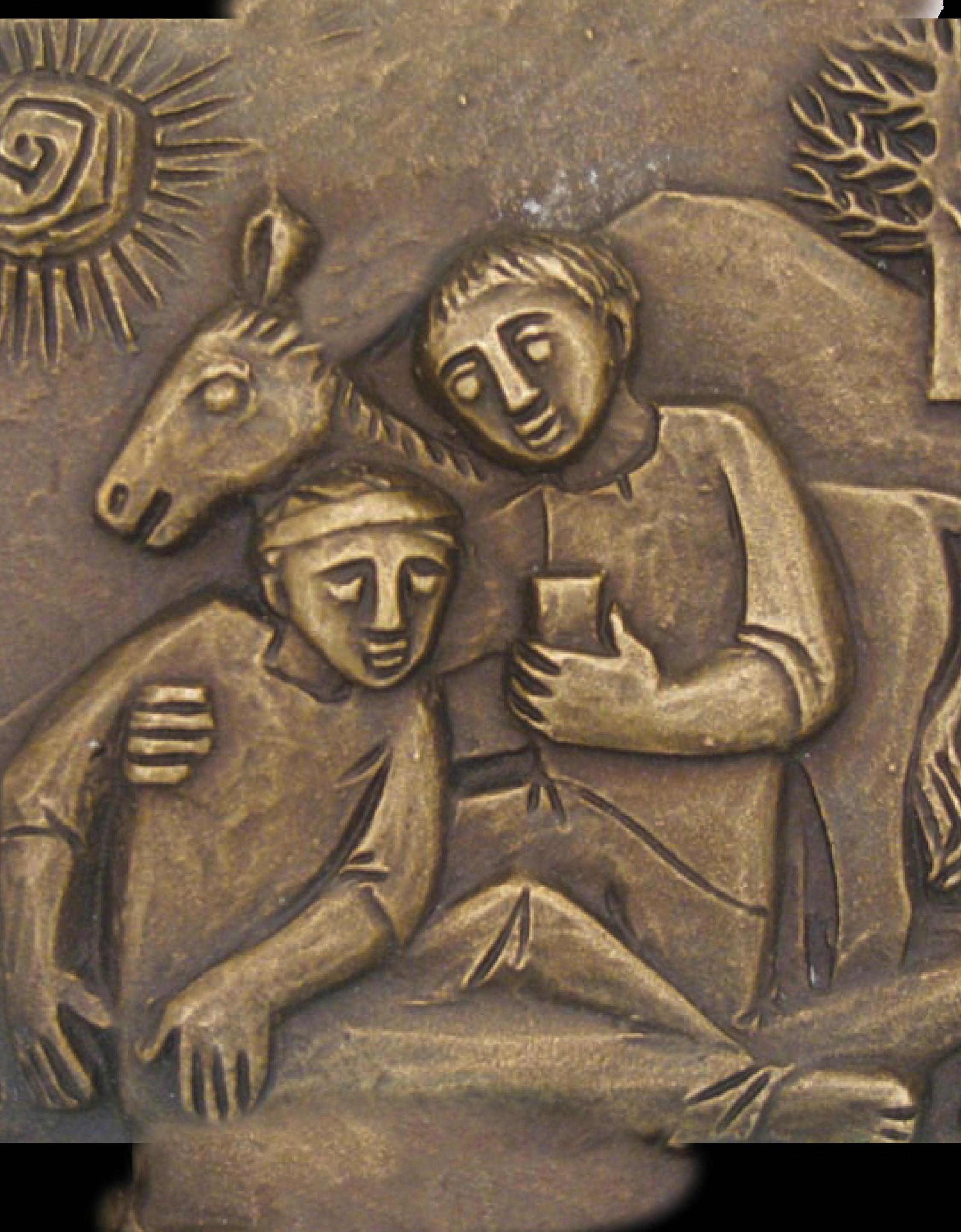
49
2. The Committee shall provide recommendations to the Board regarding:
a. Development, implementation, and assessment of:
• Leadership formation
• Spiritual care across the continuum
• Workplace justice and environment, including culture and spirituality
• Ethics committees
b. Adherence to the Catholic moral tradition, including the Ethical and Religious Directives and Catholic social teaching:
• Ethical reviews of entities/ initiatives developed and implemented to ensure fidelity to the moral tradition
• Decisions on outsourcing functions specifically impacting associates
• Care of the poor, vulnerable, and underserved
c. Mission due diligence: As requested by the CHS Administration or the CHS Board of Directors, the Mission Integration Committee will perform Mission due diligence and give recommendations, as it relates to:
• Collaborative ventures with potential healthcare partners
• The orientation of new par tners
• Business transaction review (e.g., new opportunities, partnership and collaboration, divestiture, etc.)
• Assessment of mission, ethics, and cultural compatibility of potential partners
3. The Committee will review reports regarding specific strategic, operational, and human resources initiatives that impact the mission, and will report and make recommendations to the CHS Board regarding:
a. Strategic Direction, including:
• Implications for the mission, core values, and ethics
• CHS environmental assessment
• Strategic planning assumptions
b. Leadership Development, including:
• Executive leadership formation
• Workforce development
• Succession planning/Leadership continuity
• Diversity and inclusiveness
c. Operational priorities, including:
• Spirituality and culture

• Associate satisfaction
• Program changes affecting the ministry or associates (e.g., insurance, benefits, service line elimination, etc.)
• Initiatives that implement Catholic social teaching in the workplace
• Care of the environment initiatives
• Community health/community benefit
• Institutional review boards
• End-of-life care and palliative medicine initiatives
4. Repor ts on relevant topics will be prepared for the Committee by the office of Mission or other departments/individuals as appropriate.
IV. COMMITTEE PROCEDURES
1. Quorum: A majority of the committee members in person or via teleconference shall be necessary to constitute a quorum. The Committee shall have no authority or power to act on behalf of the Board or the System, except as specifically conferred by action of the Board.
2. Meetings:
a. Frequency of meetings: A minimum of four times per year.
b. Agenda responsibility: The Chair of the Committee and the CHS Executive Vice President/Chief Mission Officer.
c. Attendance requirements: More than one-half (1/2) of the meetings convened within any twelve (12) month period.
d. Minutes: Provided to the CHS Board of Directors for review and approval.
e. Staff Suppor t: Executive Vice President/Chief Mission Officer and others as needed.
50
Two:
• A Brief History of Catholic Health
• Catholic Health System Structure
• Canonical Sponsorship and the Ministr y of Sponsorship
• Sponsorship in the Catholic Health System
• Affiliation Agreement
• Reserved Powers of the Corporate Members
• Reserved Powers of the Religious Sponsors
• Definitions
A Brief History
Catholic Health was formed in 1998 at the urging of Bishop Henry J. Mansell, when several hospitals, nursing homes, and clinics operated by religious orders, Catholic Charities, and the Diocese of Buffalo came together under one organization.
At that time, the Diocese of Buffalo, the Daughters of Charity, the Sisters of Mercy, and the Franciscan Sisters of St. Joseph became the religious sponsors of Catholic Health. They assumed the role of corporate parent of the constituent institutions, and also continued their individual religious sponsorship of the institutions they had founded. That relationship was amended through a petition filed in Rome on November 21, 2008, and approved December 20, 2008 which indicated that each religious sponsor would have the same oversight role for each constituent institution regardless of historical roles or identity. Later Catholic Health East, Ascension Health, Trinity Health, and the Franciscan Sisters of St. Joseph withdrew their sponsorship. As of November 6, 2021, the current Corporate Members and Religious Sponsors of Catholic Health are the Diocese of Buffalo and the Franciscan Sisters of St. Joseph.
Since its inception, it has grown to become one of the largest health systems in Western New York, serving hundreds of thousands of patients across its network of hospitals, long-term and sub-acute care facilities, primary care centers, home care agencies, rehabilitation services, and diagnostic and treatment centers.

52 Appendix
Catholic Health Facilities
Kenmore Mercy Hospital

Kenmore Mercy Hospital opened on October 7, 1951, on a parcel of land bequeathed to the Sisters of Mercy by James Sullivan, a former student of Sr. Mary Bernadine at St. Brigid’s School in Buffalo.
The opening marked the culmination of a vision that began in 1944 when Rev. Timothy Ring, Pastor of St. Paul’s Parish in Kenmore, and Dr. Daniel Stedem, a local physician, met with the Sisters who sponsored Mercy Hospital in South Buffalo, and asked them to consider building a hospital in Kenmore.
Soon after, Sr. Mary Mechtilde O’Connor, the hospital’s first administrator, moved to Kenmore to begin “friendraising” and fundraising for the proposed hospital.
It was not long after the 100-bed hospital opened that Kenmore Mercy outgrew its six stories and another fundraising effort was launched to build the North and South “Wings of Mercy.” Ground was broken in 1956 and the additions were completed in 1959.
Mercy Hospital of Buffalo
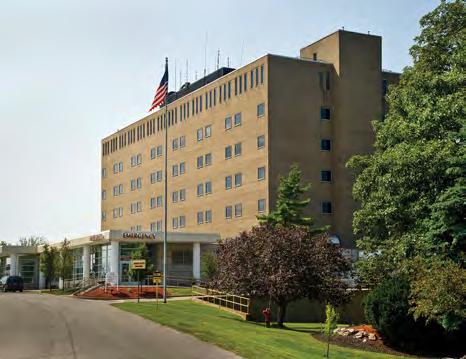
In 1858 Bishop Timon reached out to the Sisters of Mercy for assistance in ministering to the 10,000 Irish immigrants who had arrived in South Buffalo in the past two decades.
The Sisters of Mercy were founded in Ireland in 1831 by Catherine McAuley, a beautiful heiress who gave herself to the church and the care of the poor at the age of 52. Her selfless spirit of comfort infused the young order.
Bishop Timon brought the first four Sisters of Mercy from nearby Rochester to assist with schooling and support at the new St. Brigid’s parish, but they soon saw a clear need for a hospital in the
burgeoning community. They opened a 30-bed hospital in a home on Tifft Street in 1904, launching Mercy Hospital of Buffalo, a South Buffalo commitment to community and care now more than a century in the making.

The beginnings of suburbia in Western New York brought the vision and commitment of the Sisters of Mercy to the Northtowns with the founding of Kenmore Mercy Hospital in 1951.
Mount St. Mary’s Hospital
A part of the Niagara Community for more than a century, Mount St. Mary’s Hospital and Health Center began as the “Little House on the Corner” in Niagara Falls in 1907.
Founded by the Sisters of St. Francis of Williamsville, at the request of the Bishop of Buffalo, the hospital provided services to all, especially the poor. In 1965, a new hospital was opened on a 30-acre campus in Lewiston.
Mount St. Mary’s Hospital joined Catholic Health on July 1, 2015.
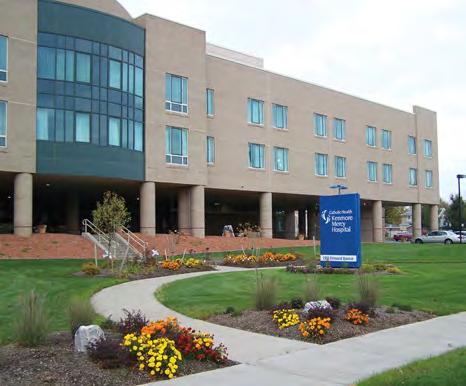
to take a chance on new therapies resulted in an astounding recovery of 80 out of the 134 cholera patients admitted to the small center.
No task, medical or political, was beyond her challenge. When the Know Nothing Party insisted there be no public payment to religious institutions for public services, she fought alongside her friend Bishop Bernard O’Reilly to win a $9,000 reimbursement from the state legislature.
And thus began the local tradition of medical, spiritual, and fiscal stewardship still celebrated daily throughout Catholic Health.
Sisters of Charity Hospital
The 1840s was a decade of firsts. Buffalo was a booming transportation hub. Canal and lake shipping were about to be overshadowed by the first railroad route connecting through to the east. The first grain elevator, first university, first elected mayor, and first Roman Catholic bishop claimed their roles in the growing town.
Newly appointed Bishop John Timon wasted little time in traveling to Baltimore to request the services of the Sisters of Charity – a religious community of women established in America by Saint Elizabeth Ann Seton – to create the city’s first hospital. Six Sisters returned to Buffalo with him –three for the hospital and three for an asylum and school.
In a former school building at the corner of Pearl and Virginia Streets, Sister Ursula Mattingly (who tackled 22 assignments in 44 years as “one of God’s trouble shooters”) took matters in hand as the first President of the Board of Sisters of Charity Hospital. Chartered as the first regional hospital in October 1848, it was sorely tested by a devastating cholera outbreak in 1849. Sister Ursula’s willingness
5554
Sisters of Charity Hospital, St. Joseph Campus (originally St. Joseph Intercommunity Hospital)
St. Joseph Hospital in Cheektowaga was opened in 1960 by the Franciscan Sisters of St. Joseph.

Mother Colette Hilbert of Poland founded the Franciscan Sisters of St. Joseph in 1897 and was missioned to Pittsburgh. When the others were recalled to Poland, Mother Colette chose to stay and minister to the growing Polish immigrant population in the United States, eventually settling in Buffalo, primarily to teach in the schools. The ministry grew to include healthcare and social service ministries throughout the U.S. and overseas.
Following the release of New York State’s “Healthcare Facilities in the 21st Century” Report, also known as the Berger Commission, in 2006, St. Joseph Hospital was slated for closure. The decision was later overturned after the State agreed to keep the Cheektowaga hospital open as part of Sisters Hospital.
Sisters of Charity Hospital successfully merged with St. Joseph Hospital in April 2009, forming a two-campus acute facility. The hospital site is now known as Sisters of Charity Hospital, St. Joseph Campus.
Father Baker Manor
Sub-acute Rehabilitation Facility & Nursing Home
Father Baker Manor is a 160-bed, residential nursing facility located below Chestnut Ridge Park just south of the village of Orchard Park. The facility opened in 1994 and is dedicated to the memory of Monsignor Nelson Baker.
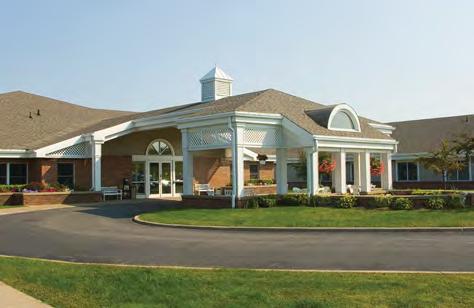
It originally began as a joint venture between St. Joseph Hospital (now Sisters of Charity
Hospital, St. Joseph Campus) of Cheektowaga, Our Lady of Victory Hospital of Lackawanna and Mercy Hospital of Buffalo.
The ground breaking of this facility coincided with the anniversary of Monsignor Baker’s ordination to the priesthood on March 19, 1876.
St. Catherine Labouré Health Care Center
Nursing Home
In 1973, Sister Rosa Daley presented the need for a long-term care facility at Sisters Hospital of Buffalo.
Following Sister Daley’s proposal, it was decided by a joint meeting of the Lay Advisory Board, Medical Staff, and Board of Directors that Sisters Hospital would construct an 80-bed long-term care facility.
The nursing home was one of the first in the area erected as part of an existing hospital. In 1976, guided by trends in healthcare, the long-term care facility transitioned to a Medicare-certified skilled nursing facility.
On May 10, 1990, under the administration of Sister Angela Bontempo, the facility invoked the name of St. Catherine Labouré Health Care Center. St. Catherine Labouré, Daughter of Charity, devoted her life to providing care for the elderly.
In 2011, Catholic Health’s adult day health care program, previously part of St. Francis of Buffalo (closed in 2009), moved to the St. Catherine Labouré campus.
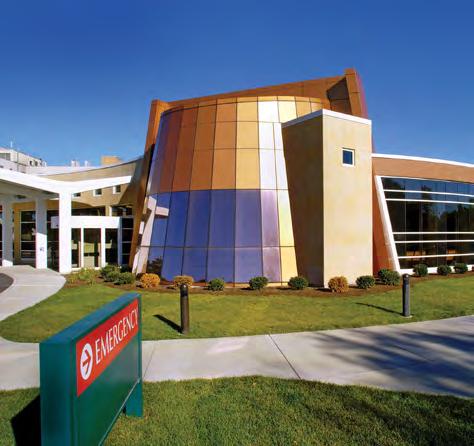
McAuley Residence
Sub-acute Rehabilitation Facility & Nursing Home
McAuley Residence opened in February of 1993 and is named after the foundress of the Sisters of Mercy, Catherine McAuley.
It opened with 160 beds, combining two existing facilities, Catherine McAuley Manor (the former Abbey Nursing Home) on Elmwood Avenue, and Kenmore Mercy Hospital Skilled Nursing Facility, located on the third and fourth floor of Kenmore Mercy Hospital.
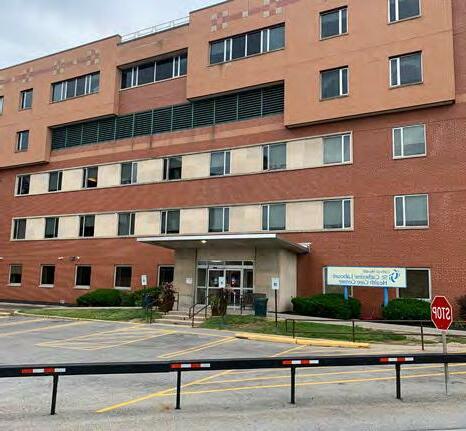
5756
OLV Senior Neighborhood
Just a few miles from the original Mercy Hospital, Father Nelson Baker opened Maternity Hospital to care for the mothers and infants housed at the adjacent Our Lady of Victory Infant Home.
Father Baker was a Civil War veteran and wellestablished businessman before entering the priesthood. His ever-growing ministry of social and human services was fueled by his faith, courage and business acumen. When his advisors suggested it was necessary to expand the new hospital to the general community, Our Lady of Victory Hospital was established in 1920.
After the hospital became part of Catholic Health, Our Lady of Victory (OLV) was combined into Mercy Hospital.
Faced with closure in 1999, Catholic Health promised the Lackawanna Community that it would develop a viable re-use of the campus.
Research showed the needs of the frail and elderly in the Southtowns were not being met. A comprehensive plan was developed, and the renaissance of the former OLV Hospital began.
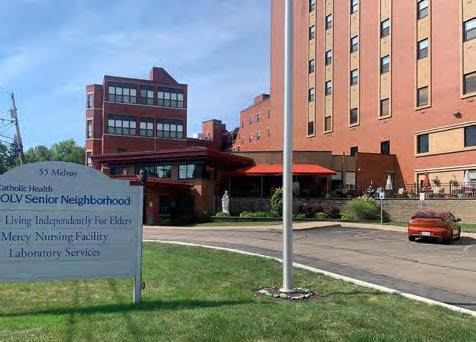
The plan included low-to-moderate income apartments, a nursing home, a program of allinclusive care for the elderly, and community spaces inside and the surrounding outside areas.
In 2008, the facility became the Our Lady of Victory (OLV) senior neighborhood, a comprehensive, stateof-the-art living facility for senior citizens.
Mercy Nursing Facility at OLV Nursing Home
Originally established in 1970, Mercy Nursing Facility (MNF) responded to a need within the hospital for patients who had nowhere else to go. These patients had conditions that made them difficult to place in community nursing homes. The initial capacity of the facility was 30 residents.
The facility has been expanded twice since 1970, adding 30 additional beds and subsequently another 14 beds. As a hospital-based nursing facility, MNF became part of Catholic Health in 1998.
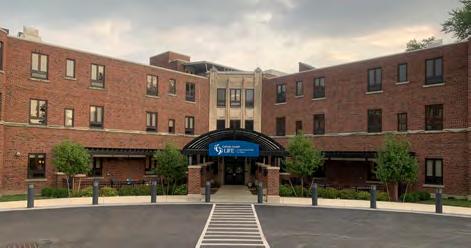
LIFE – Living Independently for Elders
LIFE is an innovative model of care for elders who require skilled care, but choose to remain in their homes in the community. The LIFE Center was opened in November 2009 and is located on the main level of the Neighborhood. Developed by Catholic Health’s Continuing Care ministry, the supervisory role of LIFE was transferred to Catholic Health Home Care in 2009.
St. Francis Park Independent Senior Living
In 2010, the Franciscan Sisters of St. Joseph planned and built the new Immaculate Conception Convent leaving behind their Mother House that was their home since 1927. The new facility was constructed to be environmentally friendly and sustainable, honoring the Order’s commitment to “care for all creation” while fulfilling a vision that would meet today’s needs and a broader community re-use strategy for the future. After a lengthy and thorough discernment process, the Franciscan Sisters sold the property to Catholic Health in 2018. Renamed St. Francis Park the facility remains the home for the Franciscan Sisters along with many members of the community who are able to live independent or with the additional support of enriched housing .

5958
Catholic Health System Structure
Corporate Structure
Catholic Health System, Inc. (“Catholic Health System”) was incorporated in New York State under the not-for-profit corporation law. It is a tax-exempt entity as described in Internal Revenue Code § 501(c)(3).
Catholic Health System is the sole corporate member of each of the Catholic hospitals, nursing homes, home health agencies, etc., which it operates in the Diocese of Buffalo. There are two corporate members of Catholic Health System: The Diocese of Buffalo and the Franciscan Sisters of St. Joseph. These two corporate members have reserved powers with respect to Catholic Health System.
They operate as a Corporate Members/Religious Sponsors Council with reserved powers which include:
1. The authority to appoint and remove members of the board of directors and the chief executive officer of the corporation;
2. The power to ratify strategic plans, budgets, and changes in corporate structure for each constituent institution; and

3. The power to approve and interpret the corporation’s purposes and the statement of philosophy and mission established by the corporation and to require that the corporation operates in conformance with the corporation’s philosophy mission and purposes. This shall include the Ethical and Religious Directives, etc.

The relationship among Catholic Health System, its constituent institutions, its two corporate members, and two religious sponsors is set forth in detail in the certificates of incorporation and bylaws of each entity. No changes in this structure may be effected without the approval or ratification of the parties.
Leadership Structure
The leadership structure chart is shown on the next page.
Catholic Health Leadership Structure & CEO Direct Reports

Chief Operating Officer
Chief Clinical Officer & Chief Physician
Corporate Compliance and Privacy Officer
Administrative Officer Chief Financial Officer
 Catholic Health Ministry Services Board of Directors
Board of Directors
President and Chief Executive Officer
Chief Mission Officer Chief Integration Officer Chief Business Development Officer
Corporate Members and Religious Sponsors Diocese of Buffalo and Franciscan Sisters of St. Joseph
SVP
Partnerships,
St.
General Council
Chief Information Officer
Catholic Health Ministry Services Board of Directors
Board of Directors
President and Chief Executive Officer
Chief Mission Officer Chief Integration Officer Chief Business Development Officer
Corporate Members and Religious Sponsors Diocese of Buffalo and Franciscan Sisters of St. Joseph
SVP
Partnerships,
St.
General Council
Chief Information Officer
Executive
Chief
SVP Home & Community Based Care SVP Acute Care President Physician Enterprise
Acute Care Reporting
Strategic
Integration & Care Delivery Niagara County President Mount
Mary’s Hospital
Canonical Sponsorship and the Ministry of Sponsorship
While sponsorship is a formal, legal relationship, those two adjectives cannot fully capture the purpose of sponsorship, the experience of sponsorship, or the accomplishments of sponsorship. Sponsorship is a dynamic approach to providing ministry, particularly complex ministry, on an institutional scale.
Canonical Sponsorship
Religious sponsorship of a health care ministry is a formal relationship between an authorized Roman Catholic juridic person (organization) and a legally formed system, hospital, clinic, nursing home (or other institution) entered into for the sake of promoting and sustaining Christ’s healing ministry to people in need. Religious sponsorship establishes a formal link between a ministry and the Roman Catholic Church.
This definition includes:
HEALTH CARE MINISTRY
A corporate work as distinguished from the work of individuals
A FORMAL RELATIONSHIP
One guaranteed by civil and canon law
AUTHORIZED
Approved by the diocesan bishop or an office of the Holy See
ORGANIZATION
A religious institute, a group of institutes (co-sponsors), a diocese, or some new canonical entity. It is characterized by perpetuity and formal rights and responsibilities. While an entire institute or diocese is regarded as a sponsor, specific individuals — a board or corporate member — are always designated as representatives to carry out the duties of sponsorship.
Ministry of Sponsorship
The Ministry of Sponsorship is:
MISSION ORIENTED
Sponsors are faithful to the call to build upon the legacy given in the Church’s rich history and heritage of commitment to the common good, as expressed through works of justice, mercy, and compassion.
ANIMATED
Sponsors encourage, inspire, and challenge the ministry of health care to be true to the healing mission of Jesus.
THEOLOGICALLY GROUNDED

Sponsors engage in theological reflection about the ministry of Catholic health care and articulate the principles of Catholic health care to and for the ministry, especially in the context of a pluralistic society
COLLABORATIVE
Sponsors initiate relationships marked by mutuality, respect, and integrity for the sake of the ministry and the common good. This is done in communion with Church leadership.
ACCOUNTABLE
Sponsors give an account to the Church, the communities served, and the congregation(s)/diocese(s) regarding the quality of service and the ministry’s integrity and fidelity to the mission. Areas of accountability include canonical and legal structure, administrative functions, oversight of management and mission integrity.
These pages adapted from CHA Toward a Theology of Catholic Health Care Sponsorship - A Work in Progress, 2005. Artwork: Permission granted by Copyright © The Catholic Health Association of the United States.
6564
Corporate Members: Religious Co-Sponsors
Sponsorship in Catholic Health System
Sponsorship is a complex set of relations of responsibility and care. In the eyes of the Church, sponsors are ultimately responsible for an organization’s fidelity to its Catholic identity and its mission. Sponsors entrust many aspects of this responsibility (e.g., policy setting, planning) to those who serve in the governance of an organization. Sponsors entrust the implementation of other aspects of this responsibility (mission, strategic direction, and policy) to the management of the organization. An ongoing relationship of trust, accountability, and mutual commitment must exist to accomplish the mission and maintain Catholic identity.
The Corporate Members and Religious Sponsors Council of Catholic Health System, comprised of the designated members that co-sponsor Catholic Health System, is the major vehicle through which the system maintains its Catholic sponsorship and identity. The Corporate Members and Religious Sponsors Council meets regularly and holds a tri-annual educational conference for members of the Catholic Health System’s leadership group and its Board Members.
The Corporate Members and Religious Sponsors Council holds certain reserved powers, including articulation of the mission and values of the system, approval of any decisions to seek a change in the canonical status of Catholic Health System, approval of the addition, change in status or termination of relationship of any sponsoring organization, and other reserved powers as indicated in the Catholic Health System By-Laws.
The Corporate Members and Religious Sponsors Council works in close relationship to the Catholic Health System Board through joint meetings and representation of the Catholic Health System Board per the By-Laws.
Sponsorship is exercised as a group and through Catholic Health System in a shared co-sponsorship model. The two sponsors are the Diocese of Buffalo and Franciscan Sisters of St. Joseph. The Religious Sponsors of Catholic Health System ensure the continuation as well as development of the mission, Catholic identity, gifts, and values of the system as a whole and its individual ministries through their ongoing relationships with the total organization and its specific organizations. They oversee the system’s fidelity to the mission that they, as sponsors, have entrusted to it. Furthermore, they act in the name of and are accountable to the Catholic Church for this mission/sponsorship.
The co-sponsors relate to and exercise influence throughout the Catholic Health System in two main areas:
• The system as a whole
• The individual ministries
• The Diocese of Buffalo, N.Y.: The Diocese of Buffalo
• Franciscan Sisters of St. Joseph of Hamburg, N.Y.
Franciscan Sisters of St. Joseph
6766
Affiliation Agreement
(Effective October 29, 2021)
1. The Catholic Health (CH) CEO will report to and be evaluated periodically by the CH Board of Directors (BOD).
2. Each Member will appoint one (1) representative to be a voting member of the BOD; not subject to the term limits for directors set in the corporate bylaws.
3. None of the Members will be required to contribute additional cash or other assets to CH or its affiliates.
4. The Members will not be required to guarantee any debt of CH or its affiliates.
5. None of the Members hold legal title over any asset owned by CH, except for the real estate that the Our Lady of Victory Senior Neighborhood sits on.
6. The Council of Members and Sponsors shall each designate one (1) Primary Representative and one (1) Alternate Representative for all meetings and activities.
7. To conduct business, a quorum consisting of the two (2) Primary Representatives, or their respective Alternate Representatives must be present in person, by video conference or conference telephone. Voting by proxy is not permitted.
8. Chair of Council shall not be deemed to be an officer of CH or its BOD.
9. Withdrawal of a Member: A Member may withdraw from membership upon not less than 120 days prior written notice.
10. Withdrawal terminates all the rights and obligations of the withdrawing Member.
11. Transfer of Membership is allowable provided that the transferee is a not-for-profit, Catholic organization, which is tax-exempt.
12. Withdrawal of a Corporate Member shall not change the religious sponsorship of CH or the Reserved Powers of the Sponsor unless the Religious Sponsor chooses to terminate its role as Sponsor.
13. The Members agree to annually review with CH management the scope of the Member corporate services or programs available to or utilized by CH and the cost thereof.
14. Any services purchased from a Member must be for fair market value.
15. CH has the exclusive right to determine which goods and services it will acquire to fulfill its operating requirements.
16. CH in its SOLE discretion shall determine from which provider it will purchase and not favor any Corporate Member when making such purchases.
17. If CH is issuing a Request for Proposal (RFP) for the purchase of significant amounts of goods or significant services, the Members shall be solicited to provide pricing and service information in accordance with the RFP.
18. CH may solicit pricing and service info from Members but has no obligation to do so. If CH does solicit info from a Member, then CH shall request similar info from non-affiliated vendors to obtain the best price and highest quality.

19. CH’s BOD shall fulfill its fiduciary obligations by overseeing the acquisition, management, use, and disposition of CH’s assets; the selection of management personnel, vendors, and contractors; the keeping of corporate records; the fulfillment of requirements licensure; compliance with all laws, rules, and governmental regulations; compliance with accrediting agencies, financial audits, and management of litigation.
20. Catholic Health’s Board of Directors will approve operating and capital budgets.
21. Corporate Members will ratify operating and capital budgets after BOD approves.
68
Reserved Powers of the Corporate Members
1. To approve and interpret the corporation’s purposes and the statement of philosophy and mission established by the corporation and to require that the corporation operates in conformance with the corporation’s philosophy, mission, and purposes;
2. To approve and amend the Certificate of Incorporation and By-Laws of the corporation;
3. To approve any plan of merger, consolidation, or reorganization of the corporation;
4. To approve any plan of dissolution of the corporation and the distribution of the assets of the corporation upon dissolution;
5. To approve the establishment, merger, consolidation, reorganization, or dissolution of any organizational relationship of the corporation, including subsidiary corporations, partnerships, joint ventures, and like relationships;
6. To appoint and remove, with or without cause, the directors of the corporation;
7. To appoint and remove, with or without cause, the chief executive officer;
8. To ratify the Chairperson of the Board of Directors of the corporation;
9. To ratify the Vice Chairperson of the Board of Directors of the corporation;
10. To ratify any debt of the corporation in excess of an amount to be fixed from time to time by the Members, except for any debt necessary to finance the cost of compliance with operational or physical plant standards required by applicable law;

11. To ratify the capital and operating budgets of the corporation to ensure that such budgets conform to the philosophy, mission, and purposes of the corporation;
12. To ratify the strategic plan of the corporation, provided that such right of ratification shall not permit the Members to exercise any of the governance authority which, under applicable law, would require approval from New York State Department of Health or the Public Health Council;
13. To ratify settlements of litigation when settlements exceed applicable insurance coverage or the amount of any applicable self-insurance fund;
14. To ratify the sale, acquisition, lease, transfer, mortgage, pledge or other alienation of real or personal property of the corporation in excess of an amount to be fixed from time to time… provided that such right shall not permit the members to exercise any governance authority held by the corporation under the applicable regulations unless the Members have received establishment approval from the Public Health Council of the state of New York;
15. The Members may extend the term of service on the CH BOD of the Director who will serve as Chair.
71
Reserved Powers of the Religious Sponsors

1. To approve and interpret the corporation’s purposes and the statement of philosophy and mission established by the corporation and to require that the corporation operates in conformance with the corporation’s philosophy, mission, and purposes;
2. To approve any provisions of the corporation’s Certificate of Incorporation and By-Laws which designate purposes of the corporation;
3. To ratify any plan of merger, consolidation, or reorganization of the corporation if the transaction involves an alienation in excess of an amount to be fixed from time to time by the Sponsoring Authorities;
4. To ratify any plan of dissolution of the corporation and the distribution of the assets of the corporation upon dissolution, if there is an alienation in excess of designated amount;
5. To ratify the establishment, merger, consolidation, reorganization, or dissolution of any organizational relationship of the corporation, including subsidiary corporations, partnerships, joint ventures, and like relationships, if alienation is involved;
6. To ratify any debt of the corporation if the transaction involves an alienation of excess of an amount fixed by Sponsors, except for any debt necessary to finance the cost of compliance with operational or physical plant standards required by applicable law; and
7. To ratify the sale, acquisition, lease, transfer, mortgage, pledge or other alienation of real or personal property, if in excess of amount set.
73
Definitions
Power to Approve or Power to Ratify*
(*As stated in the By-Laws because both words are given very specific meanings with restrictions, which would not necessarily be thought of by readers).
The power to approve includes the power to initiate action without a prior recommendation from another body or entity and the power to reject a recommended action and return the matter to the recommending body or entity with reasons for the rejection and/or suggested changes.
The power to ratify means that action approved by another body or entity shall be accepted or rejected without implementing an alternative.
Alienation
The term alienation refers to the transfer of ownership of property which includes a sale or a gift. If the amount involved is over certain financial thresholds, special authorizations are required. Other acts to which the laws on alienation apply, even though ownership itself is not being transferred, would be: issuing bonds, mortgaging property, taking out substantial loans, renouncing essential reserved powers, and certain joint operating agreements.
Depending on the threshold amount, alienation of property which exceeds the thresholds established requires the approval of the diocesan bishop and/or by the Holy See.
Corporate Member
To be a corporate member of a Not-For-Profit Corporation in New York State is comparable to being a stockholder of a business corporation with one crucial distinction: a corporate member has no ownership interest, i.e., no stock to sell. As corporate members, like a stockholder, they have the authority to select the Board of Directors, plus, whatever other responsibilities are delegated as reserved powers in the certificate of incorporation or bylaws. Corporate Membership is a civil law concept.
The Corporate Members of the Catholic Health System are the Diocese of Buffalo and the Franciscan Sisters of St. Joseph.
Corporate Members and Religious Sponsors Board
The designated representatives of the Corporate Members and Religious Sponsors Board, although distinct groups with different roles based on different reserved powers, have elected to meet jointly and to function as one body. This reflects the collegial relationship that has developed over the years and which is also embodied in the decision to have co-sponsorship, described above. The group is referred to as the Corporate Members and Religious Sponsors Board.
Co-Sponsorship
The current Religious Sponsors of the Catholic Health System have adopted a co-sponsorship model whereby each is the sponsor of not only the System but also each of its constituent institutions regardless of historical ties. This method of decision-making was approved by the Vatican in December, 2008, and is reflected in the corporate documents of the various institutions.
Religious Sponsor
Sponsorship is a term that refers to a canonical relationship a Church entity (usually a religious congregation or a diocese) has toward a ministry. Sponsorship is a reservation of canonical control by the religious community that founded and/or sustains a ministry which remains canonically a part of the Church entity. This retention of control need not be such as to create civil law liability on the part of the congregation for corporate acts or omissions but should be enough for the canonical stewards of the sponsoring religious congregation to meet their canonical obligations of faith and administration regarding the activities of its ministry. Sponsorship provides the official link to the Catholic Church and designates the ministry as an official part of the mission of the Church.
Prudent stewardship over Church property is most commonly reflected in the sponsor’s reservation of the following corporate powers:
• To establish the philosophy and mission according to which the corporation operates
• To amend the corporate charter and By-Laws
• To appoint or to approve the appointment of the Board of Trustees
• To lease, sell or encumber corporate real estate in excess of the approved sum
• To merge or dissolve the corporation
The first three powers involve corporate philosophy, corporate structure, and corporate trustees. These are necessary to ensure Church control over ministries identified as Catholic and to protect the ministry’s Catholicity as required by the faith obligation imposed by canon law on the religious sponsor. This faith obligation requires the sponsor to be vigilant so that the corporation faithfully carries out its Catholic mission and does not act in any way contrary to the Church’s teachings as they affect the corporation’s sphere of activity.
The last two powers pertain to the administrative aspects of the corporate affairs and give religious sponsors the ability to guarantee that any alienation will be done only with their approval. These last two powers protect the ministry’s fiscal solvency and meet the obligations of the proper administration of church property imposed by canon law. (It must be noted, of course, that certain property transactions must also receive the approval of proper ecclesiastical authority in addition to reserved power approval.)
The current religious sponsors of the Catholic Health System are the Diocese of Buffalo and the Franciscan Sisters of St. Joseph.
7574
Acknowledgments
Acknowledgments:
• Mark A. Sullivan, President & CEO
• Bar t Rodrigues, Executive Vice President & Chief Mission Officer
• Corporate Members & Religious Sponsors 2022-2023
Sr. Andrea Ciszewski, FSSJ
Sr. Marcia Ann Fiutko, FSSJ
Rev. John R. Gaglione, MDiv
Rev. Msgr. Robert E. Zapfel, STD, MBA
• Catholic Health Board of Directors, 2019-2020
Maureen M. Athoe, CPA, Vice Chair
Rober t M. Greene, Chair
Brian D. Beitz, Senior Credit Officer, M&T Bank
John A. Capasso, Executive Vice President, Continuing Care, Trinity Health
John L. Dusett, Executive Director, Cloud Services Business Unit, Ingram Micro Corporation
Alfred A. Hamilton, Ph.D., President & CEO Technology Solutions Consulting, LLC
Carol E. Heckman, Esq., Partner, Lippes Mattias Wexler Friedman LLP
Lisa B. Hoffman, MD Partner, President & Physician, Southgate Medical Group
Maureen O. Hurley, Esq., Retired, Rich Products
Candace S. Johnson, Ph.D., President & CEO, Roswell Park Comprehensive Cancer Center
Michael P. Keating, Senior Vice President, Buffalo Division, Wegmans Food Markets
Jay McWatters, CPA, Clinical Assistant Professor, Canisius College, Wehl School of Business
Rober t A. Minicucci Sr., Secretary, President, Health System Services
Michael J. McMurray, CPA, Certified Public Accountant
David L. Rogers, Director, Co-Founder & CEO (Retired), Life Storage
Sheldon K. Smith, Esq., Partner, Harter Secrest & Emery LLP
Mark A. Sullivan, President & CEO, Catholic Health
Paul A. Tokasz, Administrative VP & Manager, Government Relations, M&T Bank
Rober t J. Travis, CPA, Treasurer, Co-founder & Partner, Chiampou Travis Besaw & Kershner
Lawrence V. Whistler, CFA, President & Chief Investment Officer, Nottingham Advisors, Inc.
Rev. Msgr. Robert E. Zapfel, STD, MBA
• Mission Leadership
Yvonne Askew, MSN, RN-BC, Faith Community Nurse Coordinator
Heide Cornell, Director, Volunteer Services
Dennis Mahaney, Executive Resident, Mission Integration
Howard Morgan, Executive Resident, Mission Integration
Rev. Christopher Okoli, Director, Clinical Pastoral Education
Esther Sanborn, Vice President, Mission Integration
William Vaughan, Vice President, Mission Integration
Melissa Zielinski, Administrative Assistant IV, Mission Integration
• Editorial Staff: Layout: Barbara Stochmialek
Contributing Editor: Ron Hamel, PhD
Managing Editor: Bart Rodrigues, Executive Vice President & Chief Mission Officer
• Sources:
Elements for Sponsorship: A Reflection Guide (Catholic Health Association)
Sponsor Expectations 2000, 2010 (Catholic Health System)
For
Rodrigues
Vice President & Chief Mission Officer
Catholic Health Administrative and Regional Training Center 144 Genesee Street Buffalo, 6th Floor Buffalo, NY 14203
Email: brodrigu@chsbuffalo.org
7776
Core
questions, comments and feedback, please contact: Bart
Executive
78 chsbuffalo.org Sponsor Expectations: Operating Principles for the Ministry of Catholic Health 22777 Sponsor Expectations REV 9/1/2022
